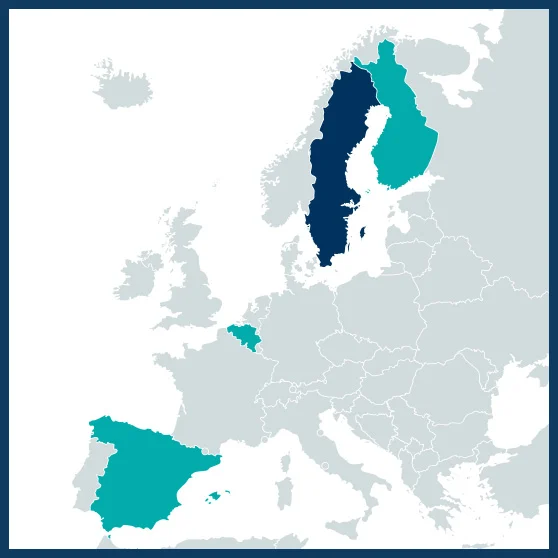01/03/2021 – 28/02/2024
€ 1,211,250
Johan A. Stenberg
johan.stenberg@slu.se
Coordinator: Plant Protection Biology– Swedish University of Agricultural Sciences – Alnarp – Sweden
Biology – Ghent University – Ghent – Belgium
Agricultural Sciences – University of Helsinki – Helsinki – Finland
Molecular Biology and Biochemistry – University of Malaga – Malaga – Spain

Climate factors such as temperature and precipitation vary tremendously over continental scales, strongly structuring biomes along latitudinal gradients. Many species, however, have continental distributions and are assumed to be adapted to cope with their local climate, either genetically or plastically. While such adaptive capacities are central to their resilience to climatic changes, few studies have explored the underlying mechanisms in terms of genetics and ecological traits.
PlantCline aims to generate and share knowledge on how climate change affects the evolution of plant traits and trait diversity, as well as interactions between the plant and pest organisms, via changes in abiotic as well as biotic conditions such as novel insect communities due to climate-induced range shifts. Overall, the project aims to obtain a mechanistic understanding of the interrelationships among selection of genes, expression of phenotypic traits, and real-life fitness. Woodland strawberry (Fragaria vesca) will be used as model species as it has a cross-continental distribution, is fully genome sequenced, and is an important wild genetic resource for garden strawberry breeding.
• A large collection of European woodland strawberry genotypes will be screened for phenotypic variation in functional traits, such as phenology, and phytochemical traits mediating resistance to abiotic and biotic stressors.
• Genetic determinants of the focal plant traits will be identified.
• Effects of climate change on local natural selection on the focal traits will be studied at several latitudes along the distributional range of wild strawberry in Europe.
• Advanced data synthesis and predictive modelling will be used to obtain a mechanistic understanding of the interrelationships among selection of genes, expression of phenotypic traits, and real-life fitness under climate change.
• Workshops with specific groups of stakeholders (agencies for pest risk analysis; crop breeding and production; agencies of environmental protection; higher education) will be organised to determine how the obtained knowledge can improve pest risk assessments, plant breeding, and in situ protection of genetic resources under climate change. Representatives from these stakeholder groups are also engaged in an advisory panel, giving feedback to the researchers throughout the project.
•Two summer schools in Málaga (focusing on evolutionary applications – molecular techniques for breeding resilient plants) and Ghent (focusing on ecological applications – optimising plant translocations for both yield and robust multifunctional species communities) will be organised to train students, young scientists and professionals (e.g. plant breeders).